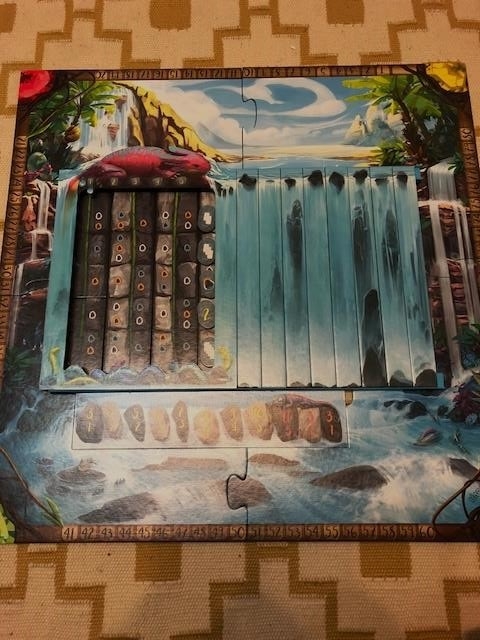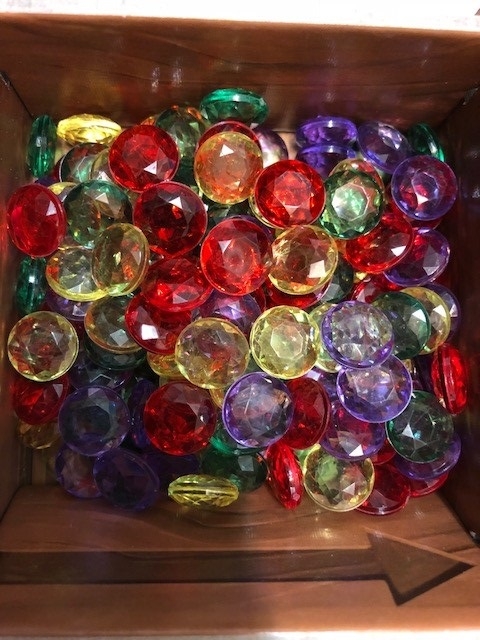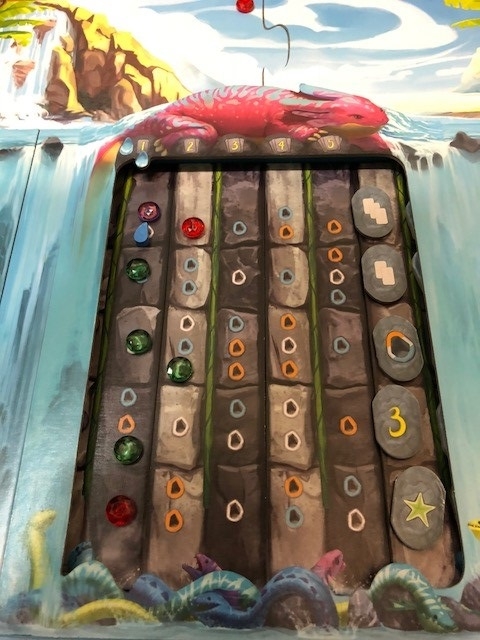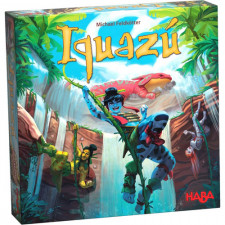Iquazu Review
on Mar 7, 2018
Critical Hits: Stunning presentation
Critical Misses: Bland, uninteresting gameplay devoid of challenge or risk; not very successful as a family design
HABA's latest big-box game, Iquazu, is a stunner. From its Avatar-inspired illustrations to its lovely faceted gemstones to the completely genius board, we are talking about almost Nintendo levels of delight across the entire product. It's just a lovely game to behold, both in the box and on the table. I was so excited to get this game in front of my kids in particular- I was hoping that I had found the next great family.

Unfortunately, Michael Feldkotter's design doesn't live up to the expectations the high quality production- let alone the HABA brand - establish. I hate to say that I'm disappointed by a game that seems to be going out of its way to create a colorful, joyful play experience, but there it is. Iquazu is a rather ho-hum mixture of staid Eurogame mechanics, which is fine and even desirable as far as I'm concerned, but there is nothing of the creative spark that drove so many great German games in this class during the 1990s and early 2000s. You'd never mistake this for a Knizia, Kramer, or Teuber class game. It plays out more like a third-tier title from that period.
The storyline is good and offers some promise from the outset. Players represent members of the Inox tribe, dwellers in the Land of Waterfalls. The task is to hide the tribe's wealth, embodied by gemstones, from an unseen and off-board threat called the Rhujas- use your imagination. They hoard the gemstones behind a waterfall, which is apparently extremely hard to reach even without the deadly water snakes down at the bottom. With the help of a Water Dragon, who temporarily blocks the waterfall, the Inox can climb down and stick their gems into color-coded slots.

In game terms, this all means that players manage hands of cards in the three colors of the gem slots and must play sets to use the slots- the further to the right of the waterfall, the more cards it costs but the longer those gems remain in play. The water dragon, which is represented by this large frame that shows the accessible areas, moves along over the course of the game both revealing new areas while covering up previously playable ones.
When the first column of spaces is filled up by player gemstones or water drops placed once per round as a kind of timer, there is an interim scoring wherein the player with the most gems in that column scores points along with a second place winner. There is also a vertical majority, with a bonus tile up for grabs that allows for extra actions or other advantages.
Iquazu turns out to be a very bland sort of area majority game with a little hand management and set collection. The chief problem is that there is no sense of development or dynamic interaction. The feeling of competition is also extremely low despite being an area control game, and there are no elements of setback or challenge. The narrative- which seems strong and is supported by the physical production- completely falls flat because there is none of the above elements. There is never really a sense of risk, which is odd given that the whole idea is that you've got these mysterious Rhujas out there, deadly water snakes, and the whole notion of rappelling down a waterfall. You just play the cards, occasionally skipping a turn to build your hand back up, and then score it up.

This also poses a problem when assessing the game as a family offering. The best family games offer very concrete connections between action and result, and provide a sense of narrative meaning to what you are doing. Iquazu fails this check because most kids, I think, won't necessarily grasp the notion of area majority with the end result just being points. And if they do grasp it, the question is if they will care about it. Yet this design doesn't offer nearly enough for more serious hobby play, especially when there is a tradition of amazing, vintage area control games from European designers. Carolus Magnus, anyone?
Iquazu winds up being something of a tragedy. I am 110% for the trend toward getting back to some of the classic European family game styles and I really enjoy fun, simple games like Kingdomino, Potion Explosion, Azul, and other recent examples of this type of design. I was hoping to find in Iquazu something like that, but there simply isn't anything compelling about this game other than its imagery and production.

 Customer Support
Customer Support  Subscribe
Subscribe 




 Account
Account  Wishlist
Wishlist 

